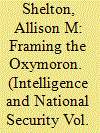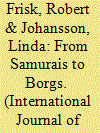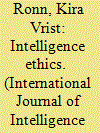| Srl | Item |
| 1 |
ID:
103570


|
|
|
|
|
| Publication |
2011.
|
| Summary/Abstract |
Despite some arguments to the contrary, I argue that because ethics benefit, rather than harm, the intelligence profession they should be considered an inherent part of intelligence studies. The literature largely presents intelligence ethics as a two-sided debate between teleologists and deontologists. I propose that ethical justifications should instead be considered along a progressive spectrum drawn from the work of moral psychologist Lawrence Kohlberg. Such a spectrum has numerous applications for gauging the moral arguments of individual practitioners of intelligence. I illustrate this using the dilemma of targeted political assassination - first in a hypothetical context, and finally using examples from the investigations of the 1975 Church Committee.
|
|
|
|
|
|
|
|
|
|
|
|
|
|
|
|
| 2 |
ID:
179140


|
|
|
|
|
| Summary/Abstract |
The current debate on intelligence ethics is internally inconsistent and suffers from at least three problematic issues. First, there is no academic consensus regarding the definition of intelligence—for instance, on whether covert operations should be included in the description of intelligence, which is relevant for discussing intelligence ethics.1 We will not immerse ourselves in the definition of intelligence, but simply include covert operations in intelligence ethics to cover as many aspects as possible. Second, it is common to view intelligence ethics as an oxymoron.2 Viewing a term as an oxymoron means viewing the term as consisting of two contradictory parts like found missing or misunderstood. If one considers intelligence ethics to be an oxymoron, then discussing whether and how intelligence activities can or should be ethical is irrelevant. The proponents of this view often claim that ethical considerations hamper the conduct of, for example, National Security Intelligence (NSI). The reason for this is the belief that ethical considerations would make intelligence agencies less effective, or even prohibit proper and essential NSI operations, covert or not.
|
|
|
|
|
|
|
|
|
|
|
|
|
|
|
|
| 3 |
ID:
146423


|
|
|
|
|
| Summary/Abstract |
A spotlight has been placed on the conduct of intelligence activities pertaining to the revelations of controversial intelligence affairs (i.e., dubious methods of interrogation, such as those used at the Guantánamo Bay detention facility; the comprehensive intelligence gathering conducted by NSA, and more). As a result, the number of scholars and intelligence practitioners concerned with intelligence ethics and with the moral justifiability of the activities conducted by intelligence services has increased.1 While the issue of intelligence ethics is now present in various scholarly debates, especially in the domain of Intelligence Studies, very little attention is being drawn to developing core understanding of the concept. Also, intelligence ethics is neither homogeneous nor yet embedded as a solid research field.
|
|
|
|
|
|
|
|
|
|
|
|
|
|
|
|